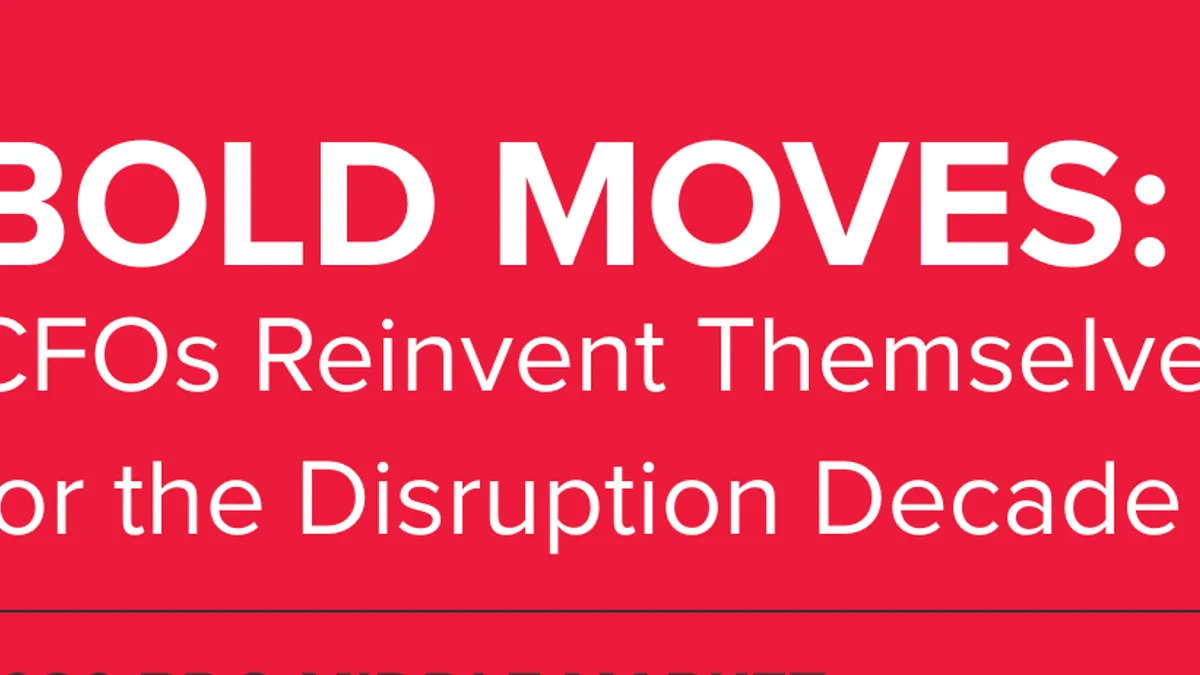Dive Brief:
- Most middle market CFOs aren’t too worried about an economic downturn this year, and instead are preparing to focus on growth, a survey by consulting firm BDO finds. Fewer than 20% of CFOs think the economy will tip into recession, and only 11% have made preparation a top concern.
- Many more CFOs are optimistic about what’s ahead: 81% think they’ll see more revenue and 77% think they’ll see more profit.
- But almost 20% say they’re concerned about competition, and more than one in 10 expect to be preoccupied with regulatory changes, particularly data privacy.
Dive Insight:
Most CFOs are gearing up to spend money on growth initiatives, starting with a retooling of their digital operations. They plan to spend money on seven areas:
- Digital transformation (54%)
- Product or service expansion (53%)
- Geographic expansion (41%)
- Restructuring or reorganization (38%)
- Private equity investment (29%)
- Mergers and acquisitions (25%)
- Initial public offering (8%)

CFOs’ focus on digital transformation is consistent with other industry surveys. Deloitte research released last year found 77% of CFOs are retooling their operations to add more automation and redeploy financing and accounting staff for higher-value functions.
The relatively low priority on M&A, and the almost complete absence of IPO plans, are also consistent with other research.
A survey by consulting firm Baker McKenzie found finance leaders are expecting a 25% drop in M&A activity, from $2.8 billion to $2.1 billion. And the continuing weak interest in IPOs has been a concern of the Securities and Exchange Commission for several years now, although at the Davos Economic Summit two weeks ago, the heads of the New York Stock Exchange and Nasdaq said they’re seeing an uptick in interest in IPOs so far this year.
Internally, CFOs have big plans for positioning their companies for growth. Almost two-thirds are planning to pour more money into research and development while only 12% are planning to pull back on that. Almost a third say they’ll spend about the same.
Investment plans for the eight main internal spend categories are:
- R&D (62% to increase, 26% to stay even, 12% to decline)
- Finance and accounting (58% to increase, 30% to stay even, 12% to decline)
- Risk management, compliance (63% to increase, 25% to stay even, 12% to decline)
- IT (69% to increase, 19% to stay even, 12% to decline)
- Marketing and sales (63% to increase, 23% to stay even, 14% to decline)
- Customer service (58% to increase, 28% to stay even, 14% ro decline)
- HR (63% to increase, 26% to stay even, 11% to decline)
- Operations (63% to increase, 24% to stay even, 13% to decline)
The internal investment will help them prepare for what they see as the top threat this year, which is data privacy. Almost 20% say that’s the biggest internal problem they have to get a handle on. And it’s not just a matter of getting the right technology and processes in place; it’s a matter of staying on top of regulations, too. Almost a quarter say data policy will be the top compliance concern this year. Slightly fewer, 20%, say getting on top of tax rules will be number one for them.
Focus on talent
Meanwhile, CFOs are trying to find ways to address one of their most pressing concerns: hiring and retaining talent.
A number of studies have come out in recent months flagging the way job roles are changing because of technology and the size of the challenge it’s been for CFOs to get the right mix of skills, experience, and work styles to prepare their operations for the way organizations will function in the years ahead.
"It’s probably no surprise to most finance leaders that technical skills relating to data analytics … are in short supply,” says Melanie O’Brien, vice president of Gartner Finance, which has been studying changes to the finance and accounting workforce. “It’s not time to be complacent."
In fact, the BDO survey finds workforce issues the number two priority this year, behind only digital transformation. It broke out these workforce issues in six categories, ranked by how much CFOs expect to focus on them:
- Increasing labor costs (21%)
- Shortage of skilled workers (18%)
- Retaining talent (17%)
- Training and development (17%)
- Attracting talent (17%)
- Navigating labor disputes (10%)
In sum, CFOs are more concerned about competitive pressures and keeping their edge through digital transformation, protecting against data security issues, and maintaining a talented workforce than they are about the economy and even broad external factors like shifting trade policies and tariffs.
For its survey, BDO defines middle-market companies that have revenues of up to $3 billion. Among the 700 CFOs responding, 29% are from companies with revenues at $500 million and under, 52% at revenues up to $999 million, and 19% at $1-$3 billion in revenue.














